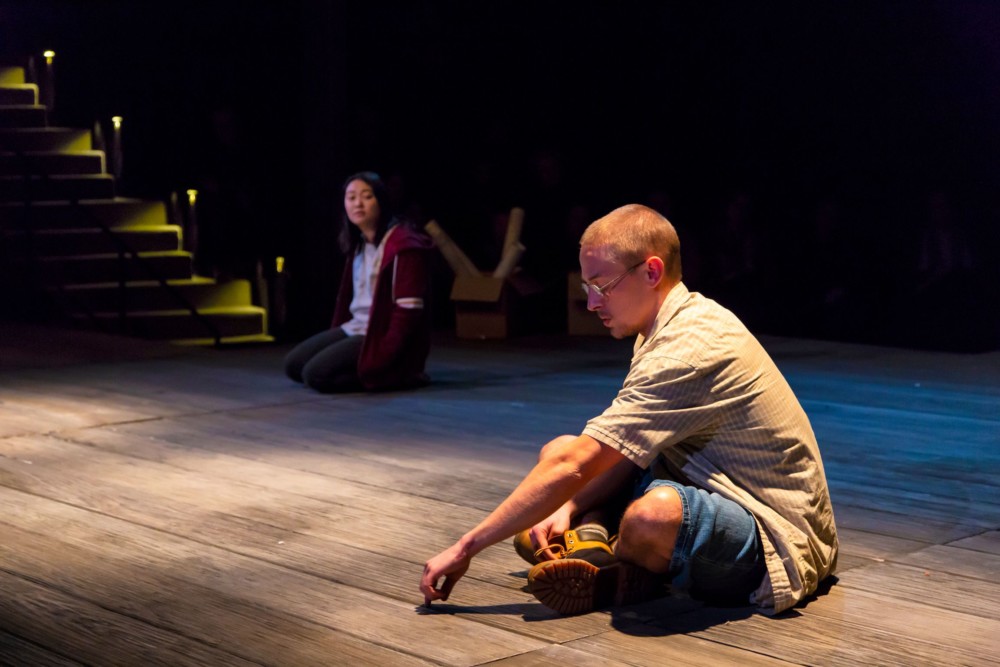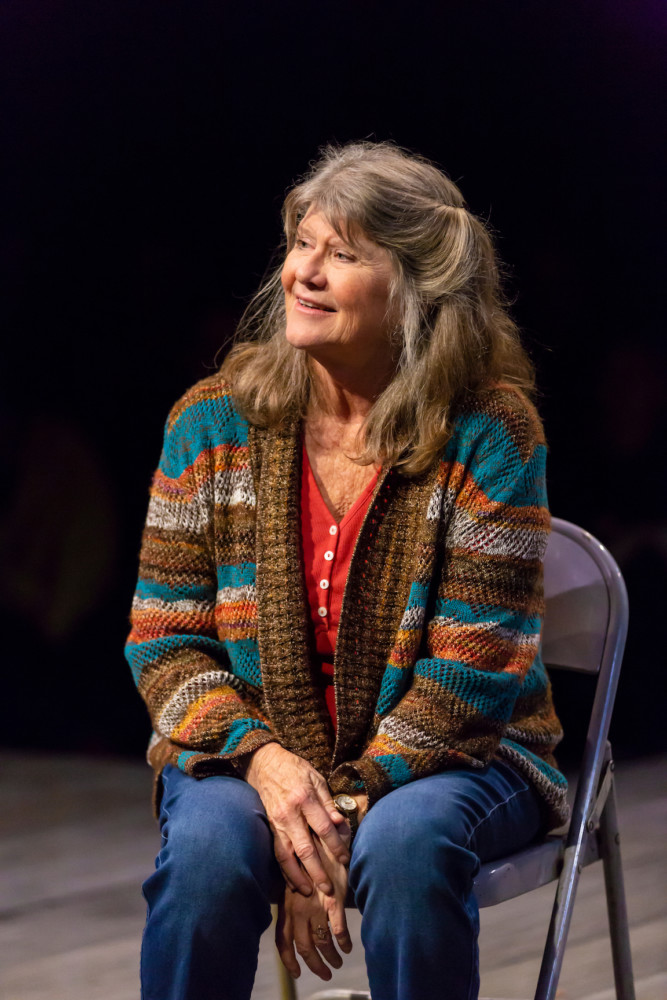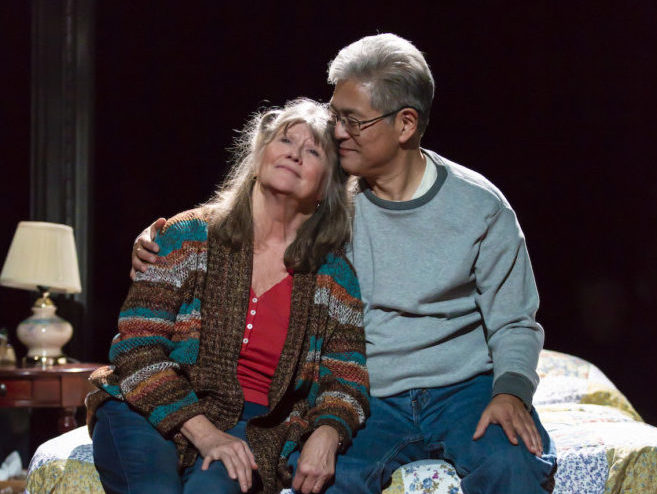
(background L to R) Nina Hellman, Ken Narasaki, Andrew Garman; (center) Judith Ivey and Edmund Donovan
By JK Clarke
As a society, here in the US of A, it’s fair to say we hardly spend much time thinking about Idaho. Sure, there’s the odd joke or two about potatoes and the acknowledgement of the first rate skiing in the craggy Cascades; but what goes unacknowledged are some eye-opening cultural trends that might even qualify as zeitgeist, or its immediate predecessor. For example, had we been paying attention to Idaho, the recent, stomach churning surge in racism and white nationalism would’ve been less surprising. In the 1980s, the area around picturesque Coeur d’Alene, Idaho became known to the Aryan Nation as “God’s Country” (a 1990 Steven Dietz play documented some of the group’s activities, including the murder of left wing, Jewish radio personality Alan Berg), and served as a remote utopian destination for those wishing to practice their bigotry (and firearms training) in relative obscurity. The migration wasn’t insignificant. White separatists from all over the country flocked to the gorgeous, mountainous countryside to start a new life (and operate countless meth labs). But long before, Idaho already represented a cultural microcosm of the rest of America in its ethnic integration, breakdown of archaic industries (mining, primarily), poverty and family dysfunction. And that picture is what’s so delicately painted in Samuel D. Hunter’s (Lewiston/Clarkson, The Whale) new play, Greater Clements, now playing at the Mitzi E. Newhouse Theater in Lincoln Center Theater through January 19, 2020.
Set in the fictitious Idaho town for which the play is named, Greater Clements is a microcosm of any small, rural American town whose primary industry (be it steel, auto manufacturing or, in this case, mining) is fading from relevance and necessity and plunging the local economy into darkness. It is the very embodiment of the fear and disillusionment that has led so many communities to place their hopes in political charlatans who peddle in nostalgia and promise an impossible return to prosperity and better times, despite an unwillingness to evolve. The mother and son household of Maggie (Judith Ivey) and Joe (Edmund Donovan) are holdouts of Greater Clements’ mining lore, operating a museum of mining history. Until recently when it was closed and sealed for a host of reasons, Joe, had led tours of the mine with a particular fascination and dedication to detail, particularly in regards to the 1972 mine fire that killed scores, including his grandfather. Now, Maggie is on the verge of closing the museum as well, representing the last of the mining-related industry in the town. Change is happening and it comes in several forms.


Haley Sakamoto, Edmund Donovan
The most significant alteration to Greater Clements is the influx of wealthy people from large cities, particularly California, looking for a home in “undisturbed” country. Their arrival has caused a rift in the community, even driving Greater Clements to vindictively unincorporate as a town because the arrivistes had begun to enact laws (surrounding garbage collection, for example) that clashed with the locals’ lifestyles. The town that locals knew and loved was, for all intents and purposes, dying.
Meanwhile, Maggie’s old high school sweetheart, Billy (a movingly understated Ken Narasaki, who represents the extremely integrated Japanese-American community that is more prevalent in the Pacific-Northwest than most of us realize) has come to town with his granddaughter Kel (Haley Sakamoto), a morose teen, in hopes of wooing Maggie and taking her back to his town in another part of Idaho. The timing seems perfect and their renewed, nostalgic love seems ideal, but heart-rending complications arise.


Judith Ivey
Davis McCallum—who has worked extensively with Hunter—directs, remaining faithful to the script’s stage direction and mood, though he perhaps would have been wise to trim the production’s excessive three hour run time. Opportunities to do so abound. What stands out, however, are magnificent performances turned in by both Ivey, as the complicated, conflicted mother who appears to feel unworthy of happiness. Her Maggie is both sympathetic and frustrating, yet completely understandable. And Donovan’s turn as her earnest, yet mentally unstable son, Joe, is even more emotive and easily one of the best performances of the year. Apparently fully committed to the role, Donovan looks as if he has neglected to eat in the months leading up to the performance, and he fully embodies the look and feel of the possibly drug-addicted, mentally disturbed, lower class, angry young man one might find in such a community. Commitment to a part is one thing, but Donovan—by comparison of his other performance photos from the past—seems to have become his character. It’s a stunning performance.
With convincing costumes by Kay Voyce and evocative lighting by Yi Zhao, Dane Laffrey’s naturalistic, yet integrated set comes alive, despite an elevating platform that ends up causing visual obstructions.
Greater Clements’ greatest value lies in its offer of a glimpse of small town, industrial America, in a place most people seldom think about. And for once it’s a study of rural America that doesn’t involve some form of disenfranchised cowboy or cowboy wannabes. It’s real and raw and offers actual insight into what might be going on outside of the big, American cities where most of us live.
Greater Clements. Through January 19, 2020 at the Mitzi E. Newhouse Theater in Lincoln Center Theater (150 West 65th Street at Ninth Avenue in the Lincoln Center campus). Two hours, 50 minutes, one intermission. www.lct.org
Photos: T. Charles Erickson






















